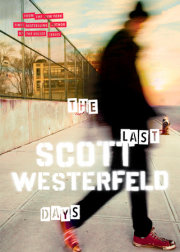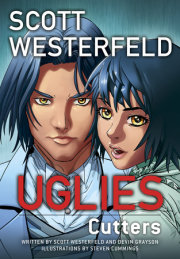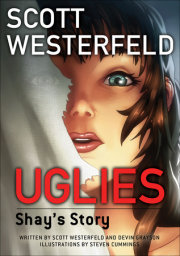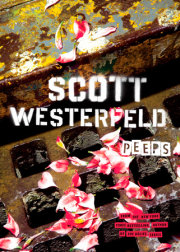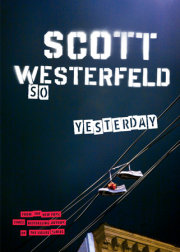The FallI think New York was leaking.
It was past midnight and still a hundred degrees. Some kind of city sweat was oozing up through the sidewalk cracks, shimmering with oily rainbows in the streetlights. The garbage piled up outside the restaurants on Indian Row was seeping, leftover curry turning into slurry. The glistening plastic bags would smell jaw-droppingly foul the next morning, but as I walked past that night, they still gave off the perfumes of saffron and freshly thrown-out rice.
The people were sweating too—shiny-faced and frizzy-haired, like everyone had just stepped out of a shower. Eyes were glassy, and cell phones dangled limply on wrist straps, softly glowing, spitting occasional fragments of bubblegum songs.
I was on my way home from practicing with Zahler. It was way too hot to write anything new, so we’d riffed, plowing through the same four chords a thousand times. After an hour the riff had faded from my ears, like it does when you say the same word over and over till it turns meaningless. Finally, all I could hear was the squeak of Zahler’s sweaty fingers on his strings and his amp hissing like a steam-pipe, another music squeezing up through ours.
We pretended we were a band warming up onstage, slowly revving the crowd into a frenzy before the lead singer jumps into the spotlights: the World’s Longest Intro. But we didn’t have a lead singer, so the riff just petered out into rivulets of sweat.
I sometimes feel it right before something big happens—when I’m about to break a guitar string, or get caught sneaking in, or when my parents are this close to having a monster fight.
So just before the TV fell, I looked up.
The woman was twenty-something, with fire-engine red hair and raccoon eyes, black makeup streaming down her cheeks. She pushed a television through her third-floor window, an old boxy one, its power cord flailing as it tumbled toward the sidewalk. The TV clipped a fire escape, the deep ringing sound swallowed seconds later by the crash on the pavement twenty feet ahead of me.
A spray of shattered glass skittered around my feet, glittering and sharp, tinkling like colliding chandeliers as shards rolled and skidded to a halt. Fragments of streetlight and sky reflected up from them, as if the television had split into a thousand tiny screens, all still working. My own eye stared back at me from a Manhattan-shaped sliver. Wide and awestruck, it blinked.
The next thing I did was look straight up. You know, in case everyone was throwing out TVs that night, and I should roll under a parked car. But it was just her—she was letting out long, wordless screams now and throwing out more stuff:
Pillows with tasseled edges. Dolls and desk lamps. Books fluttering like crash-landing birds. A jar full of pens and pencils. Two cheap wooden chairs, smashed first against the window frame so they’d fit through. A computer keyboard that sent up a splash of keys and tiny springs. Silverware glittering as it tumbled, ringing on the pavement like a triangle when dinner’s ready . . . a whole apartment squeezed out one window. Somebody’s life laid bare.
And all the while she was shrieking like a beast above us.
I looked around at the gathering crowd, most of them getting out late from Indian Row, addled by curry. The rapt expressions on their upturned faces made me jealous. The whole time Zahler and I had jammed, I’d been imagining an audience like this one: flabbergasted and electrified, yanked out of the everyday by their ears and eyeballs. And now this crazy woman, with her rock-star hair and makeup, had them mesmerized. Why bother with riffs and solos and lyrics when all the crowd wanted was an avalanche of screams and smashed Ikea furniture?
But once the shock wore off, their rapture faded into something uglier. Soon enough, people were laughing and pointing, a gang of boys shouting, “Jump, jump, jump!” in rhythm. A camera flash popped, catching a satanic flicker in the woman’s eyes. A couple of faces glowed with blue cell-phone light—calling the police, or nearby friends to come and join in? I wondered.
One of the spectators slipped into the impact zone, running half-crouched to snatch a black dress from under a rain of computer cables and extension cords. She backed away, holding it up to her body as if she’d pulled it off a rack. Another ducked in to snag an armload of magazines.
“Hey!” I yelled. I was about to point out that this wasn’t exactly Dumpster diving—the woman might want her stuff back after this psychotic meltdown was over—but then the CDs started flying. Glittering projectiles spattered on the street like plastic hail, each one impelled from the window by a shriek.
The looters retreated—the woman was aiming now, and the CDs were deadly. I mean, compact discs don’t hurt much, but these were still in their cases, giving them extra weight and corners.
Then I saw it: the neck of an electric guitar emerging from the window, then the whole instrument—a mid-seventies Fender Stratocaster with gold pickups and whammy bar, a creamy yellow body with a white pick-guard.
I took a step forward, holding one hand up. “Wait!”
The madwoman glared down at me, mascara smeared across her face like black blood, clutching the Stratocaster to her chest. Her hands found the strings, as if she was about to play, and then she let out one last terrible howl.
“No!” I shouted.
She let the guitar drop.
It spun in the air, delicate tuning hardware glittering in the streetlights. I was already running, tripping on smashed plastic and tangled clothes, thinking that there were four hundred bones in my two hands, wondering how many of them that lacquered hardwood would break after a thirty-foot fall.
But I couldn’t just let it smash. . . .
Then the miracle: the guitar snapped to a halt in midair. Its strap was caught on a corner of the fire escape, where it hung, spinning perilously.
I skidded to a halt, looking straight up.
“Over here!” someone shouted.
I glanced down for a split second: a girl my age, with short black hair and red-framed glasses, yanking something big and flat from under the clutter, sending silverware scattering in all directions.
“Watch out,” I said, pointing up toward where the Strat was untangling itself. “It’s about to fall.”
“I know! Take the other side!”
I glanced back down at her, frowning. The girl was holding two corners of a blanket she’d rescued from the pile. She unfurled its plaid expanse toward me with a flick, as if we were making a bed. I grabbed for the other corners, finally understanding. We stepped back from each other, pulling the blanket taut, looking up again. Above us, the guitar spun faster and faster, like a kid unwinding on a swing set.
“Be careful,” I said. “That’s a nineteen seventy-three . . . Um, what I mean is, it’s really valuable.”
“With gold pickups?” she snorted. “Nineteen seventy-five, maybe.”
I looked down at her.
“Incoming!” she yelled.
The guitar slipped free, still spinning, hardware glittering, strap flailing. It landed heavy as a dead body between us, almost jerking the blanket from my fists. Its momentum pulled us both forward a few skidding steps, suddenly face to face.
But there was no awful thud; the Stratocaster hadn’t struck pavement.
“We saved it!” Her brown eyes were glowing.
I looked down at the guitar, safely swaddled in plaid. “Whoa. We did.”Then the fire escape rang out again. Both of us flinched as we looked up. But it wasn’t more stuff falling—it was a pair of human figures, six stories above, descending toward the crazy woman’s window. They weren’t climbing down the metal stairs, though—they were practically flying, swinging from handhold to handhold, graceful as headlight shadows slipping across a ceiling.
I watched them, awestruck, until the girl next to me shouted two terrifying words:
“Toaster oven!”
It was tumbling out the window directly over our heads, glass door hanging open, scattering crumbs. . . .
We bundled the Stratocaster into its blanket and ran.
Copyright © 2006 by Scott Westerfeld. All rights reserved. No part of this excerpt may be reproduced or reprinted without permission in writing from the publisher.



